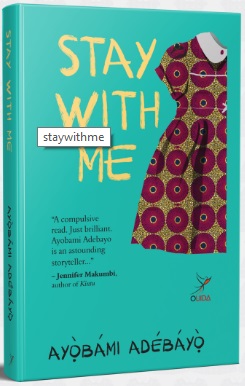Interview With Ayobami Adebayo, Author Of The Widely-Acclaimed Novel, Stay With
Ayọ̀bámi Adébáyọ̀’s stories have appeared in a number of magazines and anthologies, and one was highly commended in the 2009 Commonwealth short story competition. She holds BA and MA degrees in Literature in English from Obafemi Awolowo University, Ife and has worked as an editor for Saraba magazine since 2009. She also has an MA in Creative Writing from the University of East Anglia where she was awarded an international bursary for creative writing. Ayobami has received fellowships and residencies from Ledig House, Sinthian Cultural Centre, Hedgebrook, Ox-bow School of Arts, Ebedi Hills and Siena Art Institute. She was born in Lagos, Nigeria.
 Ayobami Adebayo’s Stay With Me was a very moving and profound novel. I thoroughly enjoyed reading every single sentence. And I’m glad it got shortlisted for the Baileys Women’s Prize for Fiction. Stay With Me explores the love marriage of Yejide and Akin. The author weaves a compelling plot that explores the themes of infertility, infidelity, Sickle Cell Disease and more. In this interview, Ayobami discusses her writing style, narrative technique and publishing experience.
Ayobami Adebayo’s Stay With Me was a very moving and profound novel. I thoroughly enjoyed reading every single sentence. And I’m glad it got shortlisted for the Baileys Women’s Prize for Fiction. Stay With Me explores the love marriage of Yejide and Akin. The author weaves a compelling plot that explores the themes of infertility, infidelity, Sickle Cell Disease and more. In this interview, Ayobami discusses her writing style, narrative technique and publishing experience.
Chioma Iwunze-Ibiam: In the 10-minute Writer’s Workshop podcast, Ottessa Moshfegh declared that the stupidest writing advice she’d ever heard was ‘write what you know’. Do you agree? And what’s the most helpful or the worst writing advice you ever heard?
Ayobami Adebayo: It all depends on how you define ‘knowledge’. If you equate knowledge with experience, then following that advice would make it difficult to write anything other than autobiography. Experience is not the only path to knowledge though. So, what does ‘write what you know’ really mean? I definitely don’t think it means write what you’ve experienced.
Some time ago, I was reading Nabakov’s memoir, Speak, Memory and I came across this -‘I’ve rewritten- often several times- every word I have ever published.’ It’s not writing advice but I’ve found it helpful and comforting.
Chioma Iwunze-Ibiam: In literary fiction, the setting matters a great deal. I liked the way the many military coups seemed to disrupt plans and propel the characters in certain directions. I am curious as to how you made this decision and how much research you had to embark on. Did you enjoy the research part?
Ayobami Adebayo: I love reading about the past and find Nigeria’s immediate and distant past endlessly fascinating, so I enjoyed learning more about the political dramas of the 1980s. Restricting the events I included in Stay with Me to what Akin and Yejide would notice and find remarkable was difficult at first and I initially forced all I’d discovered into the novel. Eventually, I took out many of the things I found interesting because neither Akin nor Yejide wouldn’t have cared about them.
Chioma Iwunze-Ibiam: Every writer has a unique tale of how they got a publisher. You, on the other hand, got many publishers. In fact, Zahrah Nesbitt-Ahmed of Bookshy Books said everyone wanted to publish your book. Please share your story with us.
Ayobami Adebayo: It’s been an interesting journey, I signed on to an agent after Stay with Me was shortlisted for the Kwani? Manuscript prize in 2013 and Kwani? offered me a publishing contract in 2014. My agent negotiated the deal but the novel still had a lot of structural problems. It took another year before I could deliver a manuscript to Kwani? so the editorial process could begin. Around that time, the agent I mentioned left publishing. My new agent, Clare Alexander, took over and submitted the manuscript to publishers at the beginning of 2016. By then end of that year, Canongate, Knopf, Ouida Books and other publishers had acquired rights to publish the novel.
Chioma Iwunze-Ibiam: I remember you saying you took the novel apart after Kwani? And that you rewrote a major part of the book. How did you diagnose the ‘faulty’ parts and how did you find a remedy for the novel?
Ayobami Adebayo: It’s difficult to discuss what was faulty without giving away the plot but I’ll just say there was little room for empathy in the early drafts and I wanted the reader to care about Akin and Yejide as much as I did. It took a while to find solutions. I spent months exploring several options until I found the ones that fit. For instance, I changed the point of view at least three times before I was certain that the first person point of view was the perfect fit for both Akin and Yejide.
Chioma Iwunze-Ibiam: Did your MA in Creative Writing help you become a better writer? Most writers seem to think that these MFA programs kill creativity. Do you agree?
Ayobami Adebayo: My MA year was the first year I would spend doing nothing other than writing, reading and thinking about writing. It was a liberating experience. I never got the sense that anyone was expected to write in a certain way, instead the workshops focused on helping you be more effective at accomplishing whatever it was you’d set out to do with your fiction.
Click HERE and HERE to find a list of outlets where Ayobami Adebayo’s Stay With Me can be purchased.



